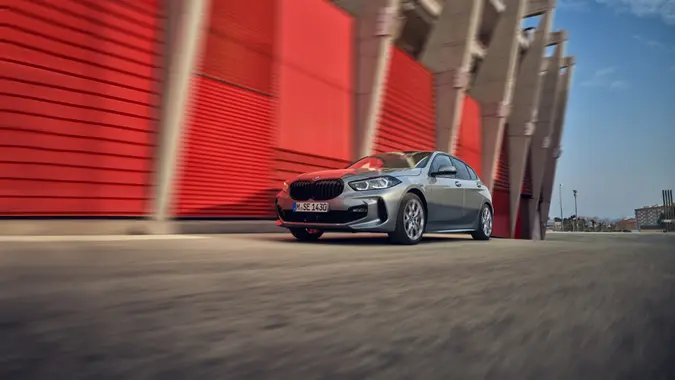Is It Better To Finance Through a Dealer or Bank? What You Should Consider First

Commitment to Our Readers
GOBankingRates' editorial team is committed to bringing you unbiased reviews and information. We use data-driven methodologies to evaluate financial products and services - our reviews and ratings are not influenced by advertisers. You can read more about our editorial guidelines and our products and services review methodology.

20 Years
Helping You Live Richer

Reviewed
by Experts

Trusted by
Millions of Readers
When financing a car, many buyers ask the same thing: Is it better to finance through a dealer or bank? This is a tricky question that doesn’t come with an easy answer.
There are a number of factors that can help you decide which option might work best for you. Below is a breakdown of how each option works to help you choose what’s right for you.
How Dealer Financing Works
Dealership financing is when you obtain or secure an auto loan through a dealership. Dealerships arrange the loan with partner banks or credit unions.
One advantage of dealer financing is access to special promotions, such as lower APRs offered by the manufacturer. Another is convenience — you can choose your car and arrange financing all in one place.
Unfortunately, dealer financing may be more expensive.
- Dealers sometimes markup the interest that the lender offered. They then keep the difference as compensation for setting up the financing.
- Here’s an example: if the lender offered to finance the vehicle for 7%, the dealer may markup the interest rate to 9% and keep the 2% difference.
How Bank Financing Works
If you ask an expert, you’ll probably be advised that bank financing is the better route to take when financing a car. Why? Because the bank is not trying to make money on a car. It simply wants interest on the loan you’ve taken out. This means more transparent terms and lower interest rates.
Also, if you finance through a bank, you can present a check to the dealer to pay for the car in full, which means you don’t have to waste time negotiating with the dealer.
Most lenders will preapprove financing for a car and lock in the rate for a limited time so you have time to shop for a car. However, some lenders may require you to buy a car from a dealer in their network, which can limit your options.
Dealer Financing vs. Bank Financing: Key Differences
Here’s a rundown of the key differences between dealer financing and bank financing.
| Feature | Dealer Financing | Bank Financing |
|---|---|---|
| Interest Rates | May be higher than bank financing, but could include promotional offers | Well-qualified buyers could get lower interest rates than what dealer financing offers |
| Approval Process | Easier approval — especially with lower credit scores; choosing a lender is not allowed | Tighter credit requirements but buyer gets to choose the lender |
| Convenience | Financing can occur the same day | Banks will usually lock in an interest rate for a limited time, such as 30 days, while you shop |
Dealer Financing: Pros and Cons
Here are the advantages and disadvantages of dealer financing.
Pros
- Convenient: Ability to purchase a car and finance it in one place.
- Promotional offers: 0% APR or other competitive offers may be available to buyers with very good credit, which can beat bank offers.
- Easier approval: Dealers often work with a variety of lenders, including those that accept lower credit scores.
Cons
- Higher interest rates: Dealers may mark up lender rates and pocket the difference.
- Longer loan terms: Dealerships may offer longer loan terms than banks to lower payments, but a longer term means paying more interest overall.
- Less transparency: Fees and loan terms may not be as clear up front as they would be with a preapproved auto loan from a bank.
Bank Financing: Pros and Cons
Here are the advantages and disadvantages of bank financing.
Pros
- Lower interest rates: Banks and credit unions often offer better rates.
- More transparency: Loan terms and fees are clearly outlined if you get a preapproval.
- Preapproval benefits: Allow buyers to shop with confidence and negotiate with the dealership as cash buyers.
Cons
- Stricter credit requirements: May be harder to qualify for the best rates if you have fair or poor credit.
- More effort required: Not a convenient one-stop shop like dealerships, which can do same-day deals. Buyers must apply and wait for preapproval before shopping for a car.
- Can be less competitive: No amazing APR offers, like 0% APR dealership promotions.
When To Choose Dealer Financing
If you’re wondering whether you should choose dealer financing, there are a few scenarios where it will be worth it.
- If you qualify for a 0% APR promotional offer or any APR that’s better than what your bank is offering.
- If you have a lower credit score. Banks generally have more stringent credit requirements than dealerships, making it easier to be approved for dealer financing.
When To Choose Bank Financing
Many banks offer preapprovals for auto financing, which will allow you to know your loan terms.
- You should opt for bank financing if you have a better than average credit score and qualify for a better rate than what the dealership is offering.
Final Thoughts: Is It Better To Finance Through a Dealer or Bank?
Although dealer financing is convenient and is within reach for people who have lower credit scores, it may come with higher costs. Dealers have partner banks and other lenders they work with on the buyer’s behalf to arrange financing. Once the lender makes an offer and the dealer accepts it, the dealer may mark up the interest rate and pocket the difference as compensation for acting as the middleman.
Banks don’t mark up the interest rate on car loans, so it’s possible to find lower rates than what dealerships offer. However, banks have stricter credit requirements, so buyers who have lower credit scores may not be preapproved or receive less competitive offers.
Overall, it’s important to compare offers from both banks and dealerships to find a financing offer that will be the most beneficial for you.
FAQ
Here are the answers to some of the most frequently asked questions regarding dealership financing vs. bank financing.- Which option has lower interest rates?
- For well-qualified buyers, a bank may have lower interest rates. However, sometimes, dealerships do offer promotional offers, such as 0% APR.
- Can I get preapproved before going to a dealer?
- Yes, many banks offer preapprovals for car loans and will typically lock in an interest rate for a certain period while you shop for a loan.
- Do dealerships negotiate loan terms?
- According to the Consumer Financial Production Bureau, negotiating loan terms with a car dealer is easy. Simply ask if you qualify for a loan with better terms.
- Is it harder to get a bank loan than dealer financing?
- For buyers with lower credit scores, it can be more difficult to get a bank loan than dealer financing because banks have stricter credit requirements.
- Can I refinance a dealership loan later?
- Yes, it is possible to refinance a dealership loan. However, it only makes sense if your credit score has improved or interest rates have dropped.
Stacey Bumpus contributed to the reporting for this article.
Our in-house research team and on-site financial experts work together to create content that’s accurate, impartial, and up to date. We fact-check every single statistic, quote and fact using trusted primary resources to make sure the information we provide is correct. You can learn more about GOBankingRates’ processes and standards in our editorial policy.
- Experian. 2024. "The Best Way to Finance a Car."
- Bank of America. "Where to get your car loan: Bank or dealer?"
- Consumer Finance Protection Bureau. 2024. "Can I negotiate a car loan interest rate with the dealer?"
- LendingTree. 2023. "How Soon Can You Refinance a Car Loan After Purchase?"
 Written by
Written by  Edited by
Edited by 

























